
Crystelle Pereira: ‘This is controversial but... French food isn’t that great’
Crystelle Pereira can’t believe how time has flown in the two years since she competed in the Great British Bake Off. “Since I hit send on that application, it’s literally felt like I have just hit, like, times 10 in speed of life!” she tells me, wide-eyed, on a video call from the home in North London she shares with her parents and one of her two sisters. The 28-year-old – who finished runner-up to Giuseppe Dell’Anno in the 2021 season – was working in a fast-paced finance job when she took part. Landing a book deal shortly after the series aired (seven publishers were vying for her signature), she waited seven months before handing in her notice to pursue a cookery career. “I wouldn’t say I’m a pessimist, but I’m a realist,” the London-born cook says. “It’s very easy to quit your job and think, ‘Oh my gosh, I’m famous, this is great’. But I thought, ‘I don’t want to quit my job blindly and chase my dreams’. I need to think, ‘Is this viable? Can I actually get work?'” How did she decide to finally take the plunge? “It got to a point where I was like, I’m just working two full-time jobs – I’ve got no more annual leave, I’m about to burn out. “And also I need to grab this opportunity with both hands and just do it [otherwise] I think I’ll always regret it.” She hasn’t looked back since: “Honestly, it’s the best decision I’ve made. [Cooking] is literally my full-time job, it’s no longer a side hobby that I rush to do after I finish a long day of work. “It means I’ve got more time to really put into my job, I’m free to go on trips to Italy to look at Parmesan,” (an excursion she’s embarking on soon) “and obviously doing my book took up so much time.” Flavour Kitchen, her debut cookbook, is a colourful ode to Pereira’s Portuguese-Goan heritage (her parents met in Mumbai before moving to the UK). Split into two halves, the savoury section features brunch bites, curries, pasta, noodles, salads and more, all bursting with international flavours, such as Goan chilli chicken fry, kimcheese toasty, and honey and chipotle baked camembert. The sweet half is all about cakes, cookies, pies and other treats with a twist. Bake Off fans will remember the pistachio, orange and cardamom carrot cake Pereira created for her final Signature Challenge. “Goa is in the south of India, and it was colonised by the Portuguese,” Pereira says, which is why Goan food is so different to the rest of Indian cuisine. Vindaloo curry, for example, has its roots in Europe: “The Portuguese had this dish called carne de vinha d’alhos, a pork and wine dish. The Goans took that and swapped Portuguese wine with Goan vinegar and that became vindaloo.” Many of the savoury recipes in Flavour Kitchen feature a liberal splash of the tangy liquid. “Our food is very vinegar-based, which sounds a bit off-putting but it just works because it’s all balanced really well,” Pereira says. “If something’s got lots of vinegar, then it’s offset with something sweet like jaggery, which is an unrefined sugar, or coconut, because coconuts are in abundance in Goa.” Given the choice, the adventurous cook would much rather tuck into fiery fish curry, egg fried rice with Korean gochujang chilli paste or noodles with “about 10 cloves of garlic” than a plate of pretentious haute cuisine. “I will be honest, this is really controversial…” she begins, pausing before admitting: “I’m not that big on French food.” Conceding that Parisian pastries are unbeatable, she continues: “I’m just more into pan-Asian and Mediterranean food – I just think the flavours are a bit more vibrant. “Like you think about South Korea, you think about gochujang; in Greece you think about fresh mint, coriander, lemon, halloumi; Mexico, you’ve got chipotle; go to the Middle East, you’ve got harissa, ras el hanout [spice mix], all these flavours.” The cook credits her mum and dad’s cooking for helping her develop a taste for the exotic, and her late grandad – to whom she dedicates the book – with overseeing her success. “He sadly he passed away before any of this took off, but I genuinely believe in life after death – I genuinely believe he’s been a big part in guiding me through all of this. “I think he just knew l was going to end up in food. Funnily enough he used to call me MasterChef – we used to watch a lot of cooking shows together.” Having amassed 190,000 Instagram followers and cooked live on Good Morning America, The Today Show and ITV’s Lorraine, Pereira is well on her way to celebrity chef status. There have been many a pinch-me moment during her first year as a fully-fledged foodie, none more surreal than when she met King Charles (at that point still a Prince) at a Queen’s Jubilee lunch event last summer. “[Charles and Camilla] turned up and I thought, ‘I’m sure they won’t come over to speak to us,” Pereira recalls. “All of a sudden he’s walked over and said, ‘Oh, do you mind if I sit there? Because there was a seat next to me.” What did the pair talk about? “I think I was just word-vomiting! I said ‘Do you like baked goods?’ and ‘Do you bake?’ “The general consensus was he doesn’t bake, but he does like to eat. He likes cakes, he likes Italian cuisine. And then I was just talking to him about my style of baking and stuff. We had a merry old chat!” As well as finding herself starstruck by royals, Pereira has had to get used to being recognised by fans: “It literally happened the day after the first episode, which was wild. “I was going to work, I was on the train platform – I had a mask on my face, which is even funnier. This girl comes up to me and goes, ‘Oh my gosh, are you Crystelle from Bake Off?” Though she was recently “so embarassed” to be spotted at the end of spin class while “red and sweaty”, being asked for selfies is a small price to pay for being able to live out her dream. “I will never complain,” she says. “Like, no one’s there like throwing things at me! If I bump into anyone on the train or on holiday or whatever everyone is genuinely so lovely, so it’s actually just really nice to be honest.” ‘Flavour Kitchen: Vibrant Recipes with Creative Twists’ by Crystelle Pereira (Kyle Books, £22).
2023-06-14 13:59

Americans are drinking alcohol at levels not seen since the Civil War, report says
As if 2023 wasn’t hard enough, Americans are now drinking as much alcohol as they did during the Civil War days. A new report from the National Institute on Alcohol Abuse and Alcoholism (NIAAA) has found that the average American drinks about the same amount of alcohol as people did in 1860. In 2021, Americans consumed 2.51 gallons of ethanol – the alcohol found in wine, beer, and spirits – compared to 2.53 gallons at the brink of the Civil War. That amount, which doesn’t include water or other ingredients found in alcoholic beverages, marks a 60 per cent increase in liquor consumption compared to the mid-1990s. Americans have also changed their taste for alcohol. The amount of beer consumed has dropped nearly 20 per cent since 1995, while wine has steadily become America’s drink of choice. Now, 50 per cent more Americans are drinking wine than they did in the mid-1990s. This isn’t the only time the United States has seen staggering levels of alcohol consumption. In 1934, following the repeal of the Prohibition Act, Americans were drinking one gallon of ethanol per person. At the end of World War II in 1945, Americans reached 2.3 gallons. This, compared to 2.8 gallons in 1980, when alcohol consumption was at its highest. The rise in alcohol consumption may also have to do with a key demographic: women. In March, it was revealed that women in the US are out-drinking men for the first time in history. Dr George Koob, director of the NIAAA, recently told the Washington Examiner that binge drinking among college students are to blame. “In 2021, there has been an uptick, particularly among women. Now it turns out on college campuses women are actually binge drinking more than men, for the first time in history,” he told the conservative media outlet. The Covid-19 pandemic also saw a dramatic shift in alcohol consumption, as most states declared liquor stores were considered “essential businesses”. In 2020, the first year of the pandemic, sales of alcohol increased by 2.9 per cent, the biggest annual increase in more than 50 years, according to the NIAAA. Now, with college campuses back in session and local bars open again, Koob attributed the rising trend of women binge drinking to the “alcohol deprivation effect” – in which people “rebound in drinking” after a period of abstaining from alcohol. “A standard drink is 1.5 ounces of vodka, 12 ounces of beer, or five ounces of wine,” he said. “When you go past a standard drink, you really are getting to the point where alcohol ultimately becomes a toxin. You can easily overdose.” The Centers for Disease Control and Prevention (CDC) says that it’s safe for women to drink no more than one standard alcoholic beverage a day, and no more than two for men. However, binge drinking usually corresponds to five or more drinks on a single occasion for men, while four or more drinks on a single occasion for women. Read More Moderate alcohol consumption may lower stress, reduce heart disease risk, study finds Man dies after eating raw oysters from Missouri seafood stand Hip surgery policies based on weight ‘worsen health inequality’, study warns TikToker cooks rack of ribs in hotel bathroom using only items from his room BBQ salad recipes without a soggy lettuce leaf in sight How to shop for and cook Japanese food at home like a pro
2023-06-14 08:19
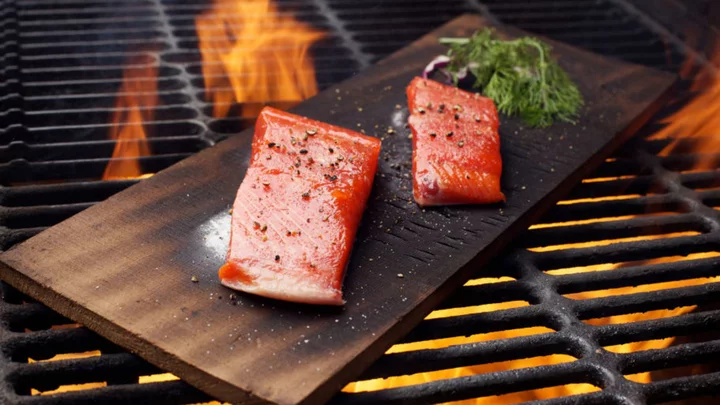
Everything You Need to Know to Start Grilling With Cedar Planks
A basic cedar wood plank is one the easiest ways to upgrade your grilling game.
2023-06-13 22:19
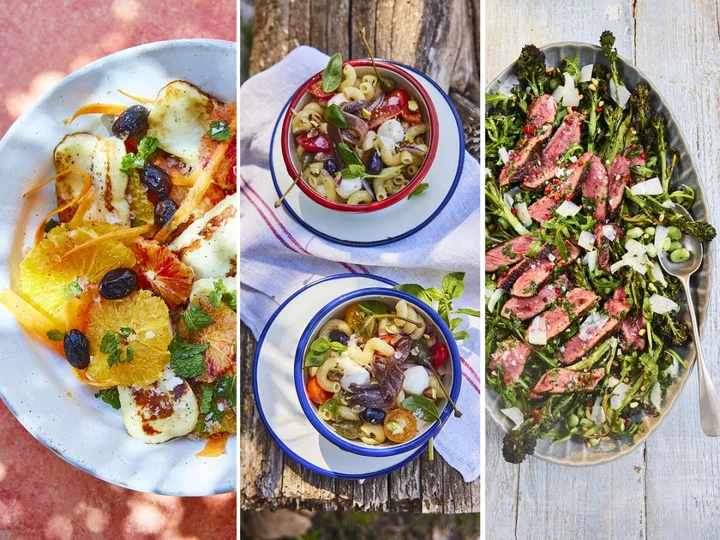
BBQ salad recipes without a soggy lettuce leaf in sight
BBQs are just as much about the side dishes as they are the burgers and various grilled meats, but that doesn’t mean you’re limited to serving soggy lettuce. These Maldon Salt salad recipes deliver on everything from a fresh and vibrant orange and carrot salad with halloumi, to a light but flavour-packed pasta salad. Or get your greens in with a steak salad with broccoli, parmesan, and a chilli and herb dressing. Orange and carrot salad with grilled halloumi This orange and carrot salad, paired with barbecue grilled halloumi creates the perfect salad for any summer dinner party. Ingredients: 2 Navel oranges 2 blood oranges 2 carrots 200g halloumi cheese 2 tbsp black olives 2 sprigs of fresh mint 4 tbsp extra virgin olive oil Maldon Salt 1 pinch of cumin Freshly ground black pepper Method: 1. Wash, dry and de-leaf the fresh mint. Set aside a few whole leaves and chop up the rest finely. Juice ½ a blood orange, filter out the excess bits/pips with a sieve, then season the juice with Maldon Salt and pepper. Add the olive oil, cumin and chopped mint and mix together well. Put this salad dressing in the fridge for later. 2. Cut the peel and pith away from the rest of the oranges with a very sharp knife until the pulp is completely clean. Cut each orange into segments and toss into a salad bowl. Using a vegetable peeler, finely shred the peeled carrots into the bowl, and add the olives and salad dressing together. 3. Chop the halloumi into thin slices, lightly brush with olive oil and then grill on the barbecue until golden on both sides. Serve together with the salad. Add a pinch of Maldon Salt for seasoning. Pasta salad The simple yet delicious pasta salad is easy to make, perfect for the hot summer months when craving for something light but packed full of flavour. Ingredients: 350g short pasta 150g cherry tomatoes 1 bag of mini mozzarella balls 16 black olives 8 anchovy fillets in oil 2 tbsp chopped toasted pistachios or pine nuts 16 capers ¼ medium red onion 4 tbsp extra virgin olive oil 4 sprigs of fresh basil with small leaves Maldon Salt Black pepper Method: 1. Wash, dry and chop the tomatoes into eighths, place them in a salad bowl and season with Maldon Salt and pepper. 2. Add the drained mozzarella balls, olives, capers and chopped onion and drizzle with olive oil. Drain the anchovies and add to the mix. Wash and dry the basil and then remove the leaves from the stem. 3. Cook the pasta al dente in plenty of salted water, according to the instructions on the packet, then drain and cool under cold running water. Once fully drained, mix the pasta in with the rest of the ingredients in the salad bowl. 4. To plate up, place the anchovies on top, sprinkle on the pistachios and basil leaves and serve at room temperature. Steak salad with purple broccoli, parmesan, and chilli and herb dressing A beautiful seared steak salad recipe paired with the best in season purple sprouting broccoli and broad beans. Ingredients: 400g sirloin steak 100ml plive oil, plus extra for frying A handful of chopped parsley A handful of chopped coriander 1 red chilli, deseeded and finely chopped 200g purple sprouting broccoli 150g broad beans, blanched 50g wild rocket 25g aged parmesan 20g toasted pine nuts A pinch of Maldon Salt Method: 1. Preheat the oven to 180C. 2. Begin by cooking the steak. Make sure your meat is out of the fridge 30 minutes before you want to cook it, so it has time to come up to room temperature. Get a frying pan or griddle pan on the heat get it to a nice high heat. Drizzle some olive oil onto your steak and season generously with Maldon salt and cracked black pepper. Once the pan is nice a hot, place the meat in and allow it to sear and sizzle on one side first. Depending on the size of your steak this can take a good 5 minutes on each side. You want good, deep caramelization on all sides of the meat. 3. While the meat is cooking place the purple sprouting broccoli onto a baking tray and drizzle over some oil and a pinch of Maldon salt. Place the tray into the oven and roast the broccoli for 10-12 minutes until tender and starting to char slightly. 4. Once the steak is cooked to your liking – we’ve served it medium rare here – remove from the pan and leave it to rest on a chopping board. The resting time is key! It helps keep all the cooking juices to stay absorbed inside before slicing. 5. While your meat rests, prepare the rest of the salad. Place the olive oil in a small bowl and mix with the chopped parsley and coriander, the diced red chilli and some Maldon salt and cracked black pepper. Set this dressing aside. 6. On a large platter scatter over the wild rocket. Next top this with the roasted broccoli and the blanched broad beans. 7. The meat will be rested now, so carefully slice at a diagonal into thin slices. Place this over the salad. Any meat juices that are left on the board can be carefully poured into the bowl with the dressing ingredients. 8. Drizzle over the dressing, shave some parmesan across the top and sprinkle over toasted pine nuts. Give the whole salad a final pinch of Maldon salt and some cracked black pepper and then serve. Recipes from Maldon Salt. Find more at maldonsalt.com/recipes-tips-blog
2023-06-13 20:49
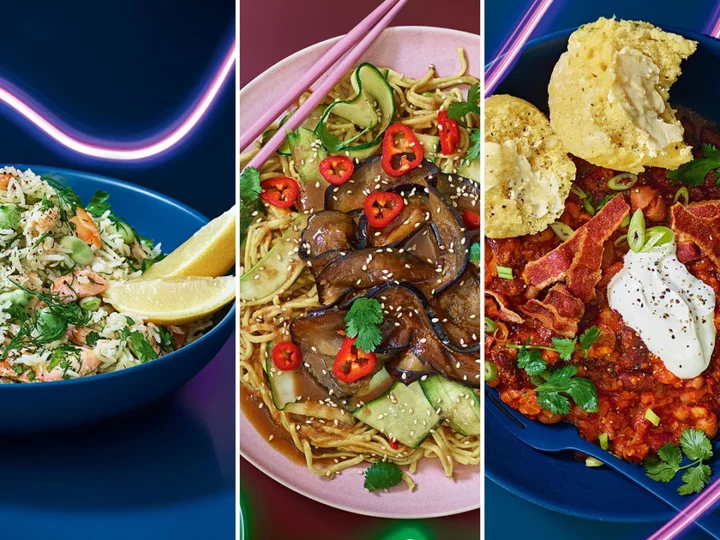
Magic of the microwave: Forget the oven with these three quick and easy recipes
Joining the Dent family in 1985, our microwave had somewhat of a bad start. It arrived, fresh out the box from Comet, in the midst of an argument. My mam had not greenlit the purchase of this cumbersome stainless-steel cube, with a vivid orange door, that Dad and I were loading onto her already packed kitchen worktop. She did not share our enthusiasm for this magical, space-age item we’d seen on BBC’s Tomorrow’s World and knew would take our snacking into the future. She was mainly outraged at the whopping £100 sum I’d cajoled Dad into spending. “I don’t trust it,” said Mam, reeling off a list of concerns, including microwaved innards, catastrophic explosions and partially cooked food giving us rampant salmonella. The truth was a little less exciting: I remember us loading the first maris piper inside, pricked all over with a fork, blasting it on HIGH for seven minutes, hoping for a crisp, fluffy jacket spud, only to find a rock-hard lump with a thin, waxy skin that hissed and spat from the holes. “See? Useless!” said Mam. My dad and I were sheepish. But as the weeks went on, Mam’s attitude to the microwave softened. For a start, it was saving her a fortune on gas as we almost stopped using the hobs for tinned spaghetti, soup, baked beans, tinned custard. Plus, the defrost button meant we now had access to all those mystery items she’d deep-frozen months back. Potato became a thing of joy as we discovered “micro-mash” (real potato, already peeled, mashed and frozen). Mam and Dad worked, so now my brother Dave and I could rush home from school and warm up glamorous microwave meals we’d begged Mam for on the big Friday shop. Macaroni cheese in a plastic tray! Microwave chips in a box! We learned how to heat food thoroughly, stopping halfway to give it a stir, before lazing on the couch, watching Miami Vice with our microwave chicken chow mein, feeling like we were fully living the dream. Nowadays, I try to limit my intake of such shiny-packeted E-number-filled joys; but still, I can’t live without my small, sleek, silver microwave. Life is too short to use a pan for frozen peas or spaghetti hoops; and how would I live without a quick 800W blast to thaw and separate veggie sausages before hurling them in the air fryer, or to defrost frozen mince before whipping up a quick chilli? Some foodie types are snobbish about the microwave; I see it as a loyal friend who has had my back for over 30 years Watt’s on the menu? Make the most of your microwave to conjure up clever meals that save on time and energy use. These ingenious recipes are from Ocadolife. Easy perfect rice with smoked trout and broad beans If you have trouble boiling rice on the hob, you’re going to love this method. It’s super-easy and yields flawless results every time. Here, it’s teamed with a summery combination of pink fish, vibrant herbs and a zingy dressing. Serves: 4 Hands-on time: 15 mins | Total time: 20 mins, plus standing (based on an 800W microwave at full power) Ingredients, available from Ocado: 250g basmati rice, rinsed 500ml hot vegetable stock 300g frozen broad beans Zest and juice of 1 unwaxed lemon, plus extra wedges for squeezing 1 garlic clove, crushed or grated 2 tbsp olive oil handful of flat-leaf parsley, roughly chopped Small bunch of dill, roughly chopped 2 x 100g packs M&S Scottish Loch Trout Flakes Method: 1. Put the rice in a large microwave-safe bowl. Pour the stock over the rice; stir well. Cover (if using microwave-safe wrap, pierce to let the steam escape); sit the bowl on a microwave-safe plate to catch drips and microwave for 12 mins. Remove; leave to stand, covered, for 10 mins. 2. Meanwhile, put the broad beans in another microwave-safe bowl with a few splashes of water, cover with a microwave-safe plate and blast for 2 mins. Remove, tip into a colander and refresh under cold running water until cooled; drain well. 3. Stir the broad beans into the rice, with the lemon zest and juice, garlic, olive oil, most of the herbs and plenty of seasoning. Fold through the trout. Divide between 4 plates and scatter over the remaining herbs. Serve with lemon wedges for squeezing. Per serving: 428cals, 1 veg portion, 10g fat (2g saturated), 22g protein, 59g carbs, 2g sugar, 7g fi bre, 1.7g salt Saucy supper silky aubergine and courgette noodles Microwaving cooks food from the inside out, so you can say goodbye to spongy aubergines and hello to beautifully soft flesh that soaks up the marinade as it cooks. Serves: 4 Hands-on/total time: 20 mins (based on an 800W microwave at full power) Ingredients available from Ocado: 2 aubergines, each cut lengthways into 8 pieces 100g egg noodles 1 large courgette, peeled into ribbons Large handful of coriander, roughly chopped 1 red chilli, sliced 1 tbsp sesame seeds, toasted For the marinade: 4 tbsp soy sauce 3 tbsp rice wine vinegar 1 tbsp sesame oil 2 garlic cloves, crushed or grated 3cm piece ginger, grated 1 tbsp miso paste 1 tsp caster sugar Method: 1. Combine all the marinade ingredients in a large microwave-safe bowl. Add the aubergine; toss to coat. Cover (if using microwave-safe wrap, pierce a couple of times to let the steam escape); microwave for 12 mins, stirring halfway, until cooked through. 2. Meanwhile, put the noodles in a heatproof bowl and cover with boiling water. Leave to stand for 3 mins or until tender. Put the courgette ribbons into a sieve, then drain the noodles over them – the residual heat will soften the courgette slightly. 3. Divide the noodles and courgette between 4 plates. Top with the aubergines, spooning over any remaining sauce. Scatter over the coriander and chilli, sprinkle with the toasted sesame seeds and serve immediately. Cover leftovers and chill for up to 2 days. Reheat in the microwave until piping hot. Per serving: 357cals, 1 veg portion, 5g fat (1g saturated), 13g protein, 60g carbs, 9g sugar, 9g fibre, 3.4g salt, £1.37 per portion Smoky bean chilli with cornbread and crispy bacon With no frying odours or splattered grease, bacon in the microwave is almost too good to be true – especially teamed with this delicious chilli and cheesy cornbread. Serves: 4 Hands-on time: 20 mins | Total time: 30 mins (based on an 800W microwave at full power) Ingredients available from Ocado: Six rashers dry-cured smoked streaky bacon For the cornbread: 2 tbsp unsalted butter, plus extra for spreading (optional) 5 tbsp plain flour 5 tbsp fine cornmeal or polenta 1 tsp baking powder 1 tbsp caster sugar 2 medium eggs, lightly beaten 6 tbsp natural yoghurt 1 green chilli, finely chopped (optional) 50g cheddar, finely grated For the chilli: 150g soffritto mix (we used Cook With M&S Frozen Soffritto Base, defrosted) 1 garlic clove, crushed or grated 2 tsp ground cumin 2 tsp smoked paprika 1 tsp dried oregano 1 tbsp olive oil 2 x 400g tins mixed beans, drained (splash of liquid reserved) 350g passata To serve (optional): Soured cream Handful of coriander, leaves picked 2 salad onions, chopped Method: 1. For the cornbread, put 1tbsp butter into each of 2 large mugs (preferably straight-sided). Microwave for 20 secs or until melted. Carefully swirl the butter around in the mugs so it greases the sides, then tip the excess out into a mixing bowl. Set the mugs aside. 2. Add the remaining cornbread ingredients to the bowl, reserving a little of the grated cheese. Season well, then stir until combined. 3. Divide the mixture equally between the 2 mugs and sprinkle over the remaining cheese. Microwave them separately for 1½-2 mins or until risen and springy. Run a knife around the edge of the cornbread to loosen; turn out onto a wire rack to cool. 4. For the chilli, put the soffritto, garlic, spices, oregano and oil into a large microwave-safe bowl. Cook for 3 mins, stirring halfway. 5. Add the beans (and a splash of liquid), passata and seasoning to the bowl; stir well. Cover (if using microwave-safe wrap, pierce a couple of times to let the steam escape), and cook for 5 mins, stirring halfway. Leave to stand while you cook the bacon. 6. Put 2 sheets of kitchen towel on a microwave-safe plate and lay the bacon in a single layer. Cover with another sheet of kitchen towel. Microwave for 1 min, then check to see if it’s crisp and starting to curl. If not, continue cooking in 20-sec bursts, being careful not to burn it. Break into shards. 7. Uncover the chilli (open it away from you to avoid the steam) and ladle into bowls. Top with a dollop of soured cream, the coriander and salad onions (if using), and the bacon. Serve with the cornbread, buttered if you like, for scooping. Leftover chilli will keep covered and chilled for 3 days. The cornbread is best eaten on the day of cooking. Per serving: 613cals, 2 veg portions, 29g fat (12g saturated), 30g protein, 54g carbs, 10g sugar, 9g fi bre, 2g salt, £1.60 per portion Read More How to shop for and cook Japanese food at home like a pro Forest Side, review: Cumbrian produce elevated to Michelin-starred proportions Showstopping BBQ main dishes for a hot grill summer 7 TikTok food hacks that actually work Saltie Girl in Mayfair will make you happy as a clam – as long as you can afford it Chef Ravinder Bhogal: Vegetables are the secret to saving money
2023-06-12 13:59

How to shop for and cook Japanese food at home like a pro
The dinner rotation is an unspoken, yet essential schedule. Most of us have five or six reliable recipes tucked away in our back pockets, ready to be pulled out at a moment’s notice. Sometimes this means cooking the same dishes week in, week out. Venturing outside this routine should be an exciting prospect. Maybe you’ve been inspired by a travel documentary or a new cookbook caught your eye. It doesn’t look that hard, right? But hunting down the right ingredients can feel like a minefield when you don’t really know what you’re looking for or even where to find them. Shopping well is crucial for success in the kitchen. God only knows the number of times I’ve come home with the wrong thing or given up because I was overwhelmed by the supermarket aisles. What if I end up wasting money on a new meal that turns out catastrophic? Some cuisines are more daunting than others. Japanese food has such a reputation for perfection that the idea of making anything other than a katsu at home terrifies me. But it wouldn’t be so scary if I had a real-life expert to walk me through the supermarket shelves, show me what to look for and demonstrate that I could indeed be churning out beautiful sushi, delicious broths and other Japanese dishes from my humble kitchen. Enter: cookbook author and teacher, Atsuko Ikeda, who has offered to take me to an Asian cash and carry to teach me how to shop for Japanese ingredients. We meet at Tazaki, a major distributor of Asian ingredients in the UK that has a warehouse in North Greenwich. It was previously owned by SeeWoo but was acquired by Tazaki last year and is currently in the process of revamping stock. However, it still carries just about everything you need to get started on a Japanese culinary adventure. Ikeda, who has authored three cookbooks on Japanese small plates, comfort food and sushi, is a frequent visitor. We begin by perusing the fresh ingredients, like daikon (white winter radish), whole lotus root and mustard greens. The whole lotus root can be sliced thinly and fried to make crispy lotus chips, while the snow-white daikon can be grated into sauce or cubed and added to soups. But we’re starting simpler. Ikeda picks up shimeji mushrooms, small round cap fungi with medium-length stems that grow from a single base. These have an earthier flavour and are denser in texture than regular button or chestnut mushrooms, which means they retain their size and shape a little better. Spring onions, avocado and carrots also make it into the basket, common vegetables that can be found in any supermarket. We move onto carbs and delve into the rice section. As Ikeda is teaching me how to make sushi later, she explains that it is made with Japanese short-grain rice; it has a more glutinous, starchy texture than long-grain rice, which is more popular in the UK. This starchy quality of short-grain rice makes it stickier, an essential feature to make sure sushi rolls and nigiri bites don’t fall apart. A trusted brand for most Japanese ingredients, including sushi rice, is Yutaka, which can be found almost anywhere – I’ve seen it stocked in my local fishmonger. Plenty of other brands abound, with some supermarkets even providing their own brand products, but Ikeda’s recommendation goes straight into my basket. She points out a variety of noodles, and we’re talking much more than udon. There are bouncy shirataki noodles, almost transparent noodles made from konjac yam that can be eaten hot or cold. You can purchase frozen ramen noodles if you’re experimenting with making your own ramen, but Ikeda winks as she tells me she usually just goes to her favourite ramen shop when she’s craving it. Soba noodles, which can be bought dried, are perfect for the summer when tossed into a cold peanut sauce with an assortment of vegetables. The list goes on and on, but Ikeda reassures me that most noodles are versatile and it mainly depends on what type of texture you’re going for rather than flavour. Next is the condiments aisle, where miso resides (can miso be considered a condiment? I’m not so sure). Miso is, of course, a must-have staple. Ikeda points out three types: white miso, sweet rice miso and barley miso. Later, when we taste them, I’m surprised to learn how vastly different they taste from one another. The white miso, which is the most common type used in recipes, has a slight tang and a savouriness that makes your mouth water, while the barley has a deeper, maltier flavour that is mcuh more comforting. I highly recommend buying different types to taste for yourself. Ikeda also introduces me to yuzugosho, a spicy, tart condiment containing the yuzu fruit and fiery green chillies. It brought a tear to my eye, both from the heat and delicious flavour. Ikeda also teaches me that most commercial wasabi contains more horseradish than wasabi, so buyer beware: if you’re seeking the real deal, you may have to be prepared to shell out more money than you initially think. Some brands are 100 per cent horseradish, marketed as wasabi, so checking the label is essential. The same goes for mirin, a Japanese sweet rice wine which varies in alcohol content. A good rule of thumb is that the cheaper the mirin, the lower the alcohol content. Soy sauce is another staple for most Asian cuisines, but there are differences. Ikeda prefers to use tamari soy sauce, which is thicker and, I find, not as intensely salty as the soy sauce you usually get in tiny fish-shaped plastic bottles from takeaways. At home, I’m a Kikkoman soy sauce fan, but Ikeda recommends Yutaka’s organic tamari soy sauce for a more mellow, sweeter flavour. In terms of proteins, it depends on what dish you want. We’re focused on fish, particularly sushi-grade salmon, which you can buy from Tazaki or most fishmongers. This is where I’m especially nervous, because it’s easy to get the cut wrong. However, knowledgeable fishmongers are your best friends when it comes to choosing the cut, so ask plenty of questions. Ikeda shows me how to slice the salmon for different types of sushi rolls and nigiri, as well as how to steam the fish in a baking parchment parcel, slathered in miso and accompanied by the shimeji mushrooms we’d purchased earlier. You can also add fish roe or masago caviar to your Japanese dishes. The bright orange spheres add a unique saltiness and a satisfying texture to sushi, but can also be used to top rice dishes or stirred through Japanese-inspired pastas. A reliable brand is Elsinore, which can be found in Waitrose. I still find the idea of making sushi daunting, but the supermarket aisles no longer feel so intimidating now that I have a clearer idea of what to look for. It reminds me of how fun it is to try something new in the kitchen and, armed with cookbooks from the experts, the delicious results will keep me coming back for more. Read More Grace Dent’s quick and easy recipes that only require the microwave Forest Side, review: Cumbrian produce elevated to Michelin-starred proportions Showstopping BBQ main dishes for a hot grill summer 7 TikTok food hacks that actually work Saltie Girl in Mayfair will make you happy as a clam – as long as you can afford it Chef Ravinder Bhogal: Vegetables are the secret to saving money
2023-06-12 13:58

‘Spiral hotdog’ cooking technique goes viral amid UK heatwave
An unusual method for cooking hotdogs has gone viral on TikTok after food influencer Carolina Gelen shared a tutorial video for “spiral hotdogs”. Gelen, who shares recipes with more than 560k followers on TikTok, posted her latest tutorial last week and has garnered more than 1.8m views in under three days. Her method of cutting hot dogs into a spiral before cooking them gives the sausages more surface area for caramelisation and toppings, she said. The home cook demonstrates inserting a skewer lengthwise into a hotdog and using a knife to cut around it at a 45-degree angle. This creates a spiral hot dog that lengthens but does not break apart. Gelen then cooks them in a cast iron pan over a fire and explained that the new shape makes the meat “open up in the pan”. “They caramelise beautifully and they can hold so many more toppings due to their shape,” she told viewers. “All those flavours and sauces will fall between those nooks and crannies and stay in between the buns.” Gelen recommends making her roasted red pepper salsa and pickle mayonnaise for toppings, but people who try her method can use whatever hot dog toppings they enjoy. She finished the video by assembling her hot dog, which was loaded up with her salsa, mayonnaise and mustard. @carolinagelen spiral hot dogs #hotdog #cooking #grilling #food ♬ Sunday - HNNY Viewers have been enjoying trying Gelen’s method of cooking hot dogs, with one person writing: “You just changed my life.” Another said: “This is genius. I only like grilled hot dogs and this will definitely maximise caramelisation.” A third added: “My hot dog life will never be the same thank you.” The video was also shared on Twitter and has gained a similar reception, with many users declaring they will try it out. “One of those tips that immediately strike you as game-changing and legit,” one person wrote. “Maillard reaction = flavour. And those new nooks and crannies can hold on to toppings better. “I’ll be 100 per cent doing with my hot dogs and bratwursts from now on.” Another said: “I did the spiral hot dogs thing tonight and I can confirm it’s got me a Michelin star.” Some people pointed out that this method is common in some cuisines, such as Filipino food, and confirmed it is a delicious way to prepare hot dogs. The viral tip comes as the UK is experiencing the highest temperatures of 2023 so far, with the mercury hitting 30C in most of the country on Saturday (10 June). Many will undoubtedly be having barbecues as the temperatures soar again today (Sunday 11 June) and can try Gelen’s method of cooking hot dogs. However, the Met Office has issued yellow warnings for thunderstorms across parts of England and Wales and some areas could be hit by torrential rain this weekend. Read More More thunderstorms and 30C temperatures forecast after hottest day of the year 7 things fitness experts want you to know about exercise during a heatwave Weather – latest: Health warning escalated as ‘extreme’ heatwave set to make UK hotter than Spain Schoolboy almost dies from swallowing magnets for TikTok challenge Woman shares honest review of New York City apartment TikTok mom slammed after making 5-year-old son run in 104 degree heat
2023-06-11 23:17

Today’s Google Doodle reignites age-old British debate about scones
Google is celebrating British scones today (Saturday 10 June) with an adorable Google Doodle that nods to the age-old debate around jam and cream. The illustration features two anthropomorphic scones eyeing each other suspiciously. On top of the scone on the left is a layer of cream, then jam; while the scone on the right has jam first, then cream. The Doodle is a playful reference to one of Britons’ favourite things to debate over – in which order should one put jam and cream on their scones? Cream tea has been a part of the UK’s culinary traditions since the 11th century, but there is a big difference in opinion between people living in Devon and those living in Cornwall. In Devon, clotted cream is typically spread first followed by jam whilst the Cornish tradition is to spread jam first, and then the cream. On Twitter, many keen-eyed Britons have noticed the Google Doodle reference, much to their delight. “They’ve been very diplomatic in depicting it the proper way and misguided way,” one person wrote, adding a winking emoji. Another said: “Looks like today’s Google Doodle is trying to stir up trouble big time.” A third added: “Today’s Google Doodle is not going to go down well in Devon and Cornwall.” Others highlighted yet another scone-related conundrum unique to the UK, which is how to pronounce the word “scone”. Some parts of the UK pronounce it rhyming with “gone”, while others say it should rhyme with “cone”. One person said it should be pronounced “sc-on” because “once you’ve had it… it’s gone”. Another said they use both pronunciations but added: “If I want to sound posh I go for ‘s-cone’.” In 2018, it emerged that the late Queen Elizabeth II enjoyed her cream tea by having jam spread on her scones first, followed by cream. Former royal chef Darren McGrady tweeted: “Jam first at Buckingham Palace garden parties! “The Queen always had homemade Balmoral jam first, with clotted cream on top at Buckingham Palace garden parties in the royal tea tent and all royal tea parties.” Read More Who is Willi Ninja? Google Doodle celebrates iconic Black LGBT+ dancer and choreographer Perfect picnic fare: Parmesan and pine nut scones Best luxury UK hotels 2023: Where to stay for great food, family adventures and spa retreats Google Doodle reignites age-old British debate about scones Sixth grader’s drawing dedicated to her sisters appears as today’s Google Doodle Forest Side, review: Cumbrian produce elevated to Michelin-starred proportions
2023-06-11 16:28

Why Are Peaches Fuzzy?
Whether you enjoy the velvety skin on peaches or peel it off, you may wonder why they developed fuzz in the first place.
2023-06-09 22:21
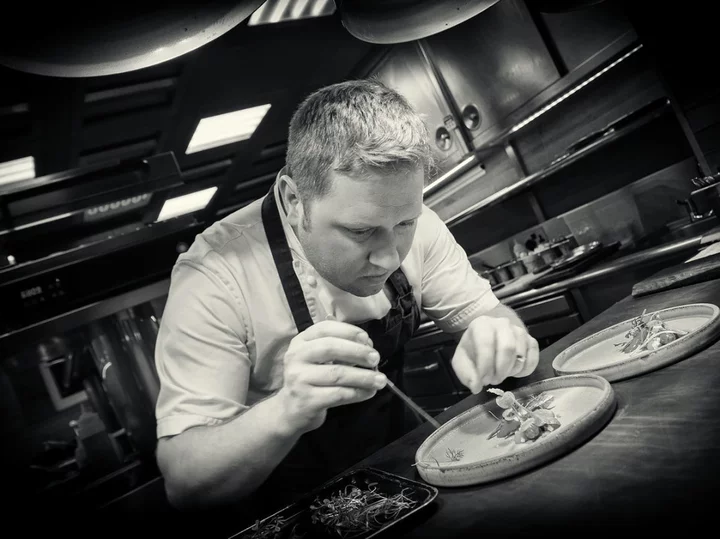
Forest Side: Heavenly Cumbrian produce elevated to Michelin-starred proportions
When is a Waldorf salad not a Waldorf salad? When it’s almost a pudding – and there’s not a lettuce leaf in sight. This simple side salad of celery, walnuts and apples was invented in 1893 at the Waldorf Astoria Hotel in New York. While it’s been subject to many reinterpretations over the years, the Forest Side’s head chef Paul Leonard garnered a Michelin star for his take on this classic dish. Arriving in a delicate and crisp stewed-apple tart case that takes no less than 72 hours to create, it’s filled with a creme fraiche cake, walnut brittle, dehydrated grapes and confit celery. Walnut, celery and apple gels are also added, along with a Granny Smith apple skin sorbet, all topped with a walnut tuile. The different flavours and texture compliment each other perfectly, creating an unforgettable sweet and sour flavour bomb that continues to linger long in the memory. This petite morsel of food forms part of Leonard’s eight-course Michelin-starred menu at the Cumbrian hotel and restaurant, which was named the Best Country House Hotel of the Year in the 2023 Good Hotel Awards. In addition to the star, it’s also been awarded four rosettes, ranked number nine on Square Meal’s annual list of the UK’s 100 best restaurants and reached the top 30 of Harden’s Top 100 of the Best UK Restaurants. Which is a long way of saying that there’s plenty of justifiable interest in this superb family-run operation and that it’s been a good 2023 for the team. And it’s far from Leonard’s first culinary rodeo. Having cooked under Marcus Wareing and Andrew Fairlie, the Hull-native retained a Michelin star at The Isle of Eriska on the west coast of Scotland, before heading up the luxury Devonshire Arms in Bolton Abbey, Yorkshire, where he won four rosettes for his cookery. In 2019, he joined the team at the Forest Side. Here, the emphasis is very much on making the most of this sensational landscape, in both aesthetics and taste, with Leonard aiming to source 90 per cent of produce from within a 10-mile radius of the establishment. Handily, an extensive and original red brick Victorian walled garden is home to many of the ingredients rustled up by the team, including saffron, courgettes, tomatoes and an “unofficial” apple orchard that boasts 300 different types of apple. And what a successful collaboration it is. Guests arrive in the light and airy dining room, which looks out to the red-squirrel-occupied garden and dramatic fells. Reclaimed timber and steel tables sit aside a central sommelier’s table crafted from a windblown tree in the grounds. But instead of the buttoned-up atmosphere that often permeates restaurants of this calibre, the familiar sound of classic anthems – think Fleetwood Mac, The Kinks and Pulp – floods through the space, extinguishing any sense of forced propriety. It’s an intentional move initiated by Leonard and a welcome one more restaurants could learn from: a relaxed room of toe-tapping patrons is significantly happier than one with a reverential silence. Snippy waiters with clipped accents have no place here. At the Forest Side, staff seem genuinely delighted to be there, arriving with smiles and warm inflections. Under Leonard’s leadership, junior chefs present each course and it’s a genuine pleasure to see their passion for and pride in the food they’ve created. Proceedings kick off with a trio of “snacks”: a rhubarb and whipped chicken liver tart, a Hafod cheddar gougère, and a croustade of brown buttered shrimp. The gougère is scrumptious – buttery and nutty and blanketed with a slice of bresaola – while the whipped chicken liver is smooth and rich. Kohlrabi with cured and lightly smoked trout is served with a salsa verde made from garden herbs and cured trout roe, while a unctuous broth is made from pork fat, seaweed and mushrooms. “Beetroots cooked in their own juice all day” might not seem like the kind of dish to set hearts aflutter, but this isn’t any old root veg. The humble vegetable is cooked all day in its own juice before being dehydrated to create a fudgy texture, and served with a chamomile-infused yoghurt. It’s delicious. We gobble down a supple scallop, followed shortly by the most tender and rich hogget, splashed with a sauce made from confit lamb tongue, pickled mustard seeds and wild garlic buds. And the bread! Baked before each service, this milk loaf is glazed in Marmite and simply served with a butter made at the nearby Winter Tarn Dairy. This early course is luxury comfort food at its best and we’re forced to restrain ourselves for fear of spoiling our appetite. We finish off with “first rhubarb of the year”, ginger and custard, which is as delicious as it sounds: a perfect balance of sweet vanilla, sorbet and herbs. Satiated, we make the easy trip upstairs to our room, one of 20 at the hotel, all of which have garden views and make the perfect end to our decadent dining experience. Is there still a place for fine dining restaurants during a cost-of-living crisis? As employers and buyers, producers and supporters of local food, they’re invaluable to the economy, while for gastronomes who wish to splash some cash treating themselves or someone else, they’re a luxury much like a pair of tickets to see Beyoncé or a championship football match. Overheard snippets of conversation among fellow guests reveal birthday treats or anniversaries, of a weekend away from the grind to relax in this glorious gothic mansion house amidst the fells. Whatever the reason, a trip to the Forest Side is quite simply sublime. A four-course dinner menu costs £85pp, while an eight-course dinner menu costs £130pp. A four-course lunch menu costs £55pp, while an eight-course lunch menu costs £85. Wine pairings come in flights of four, six or eight and start from £75 per person. B&B and dining packages are also available - visit theforestside.com for more information. Read More Showstopping BBQ main dishes for a hot grill summer 7 TikTok food hacks that actually work Saltie Girl in Mayfair will make you happy as a clam – as long as you can afford it Chef Ravinder Bhogal: Vegetables are the secret to saving money How to make tomato confit with whipped feta Kataifi: A comforting Greek pie full of veggie goodness
2023-06-09 13:57
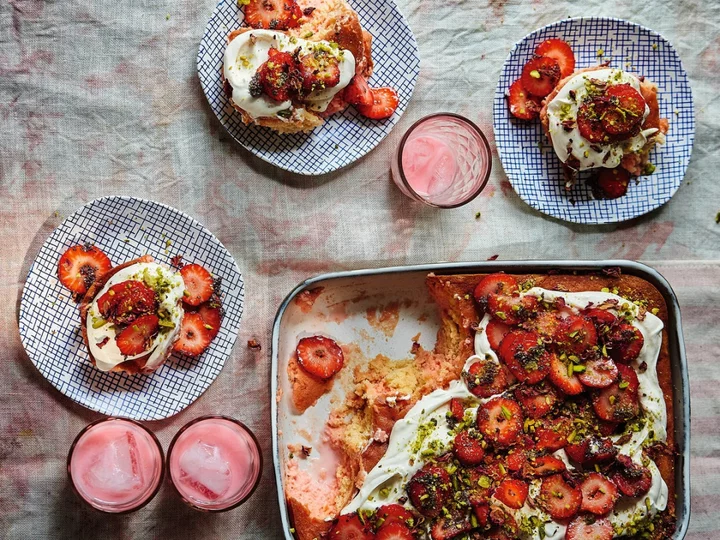
Falooda milk cake: A new way to eat your summer strawberries
British colonial rule may have divided up India, Pakistan and Bangladesh, but we are all united in our love of falooda – a rose-tinted milkshake textured with bubbly basil seeds and noodles,” says Ravinder Bhogal. Faloodas come in many flavours, but her favourite is “the original and the best – rooh afza, make a thick concentrated floral syrup that turns milk Barbie pink”. The syrup can be easily found in Indian and Pakistani supermarkets. “Here, inspired by my friend Ravneet Gill’s excellent Rasmalai Cake, I have used rooh afza-flavoured milk to make a sort of tres leches cake. If you can’t find basil seeds, use chia seeds, which have a similar tapioca-like texture when hydrated.” Strawberry falooda milk cake Ingredients: 225g plain flour 1 tsp baking powder ½ tsp salt 5 eggs 175g caster sugar 1 tsp rosewater 115g unsalted butter, melted, plus extra for greasing For the falooda milk: 50ml rooh afza 200g condensed milk 250ml whole milk 300ml double cream For the topping: 300g strawberries, sliced 2 tbsp basil seeds 1 tbsp rosewater 1 tsp caster sugar 300ml double cream Dried rose petals, for sprinkling Crushed pistachios, for sprinkling Method: 1. Preheat the oven to 180C/fan 160C/gas mark 4 and lightly grease a three-litre (33 × 23cm) baking dish with butter. 2. In a jug or bowl, whisk together all the ingredients for the falooda milk and leave in the fridge to chill till required. 3. Sift the flour, baking powder and salt into a bowl. Put the eggs and sugar in the bowl of a stand mixer fitted with the whisk attachment and whisk on high speed for about seven minutes until thick and pale (or whisk in a bowl with a hand-held electric whisk). Fold in the flour mixture and rosewater, then fold in the melted butter. Spoon into the baking dish, smooth the top and bake for 30-35 minutes until golden brown, and a skewer inserted into the cake comes out clean. 4. When you remove the cake from the oven, prick it all over with a skewer and keep warm. Pour over the falooda milk and leave to cool to room temperature. Cover and refrigerate overnight. 5. To serve, mix together the strawberries, basil seeds, rosewater and sugar and set aside. Before serving, gently whisk the double cream in a bowl until it has a soft, rumpled bedsheet texture. Spread the cream over the surface of the cake and then spoon the strawberries over the cake. Top with rose petals and crushed pistachios. Recipe from ‘Comfort & Joy: Irresistible Pleasures From A Vegetarian Kitchen’ by Ravinder Bhogal (Bloomsbury, £26). Read More Showstopping BBQ main dishes for a hot grill summer 7 TikTok food hacks that actually work Saltie Girl in Mayfair will make you happy as a clam – as long as you can afford it Chef Ravinder Bhogal: Vegetables are the secret to saving money How to make tomato confit with whipped feta Kataifi: A comforting Greek pie full of veggie goodness
2023-06-08 21:16
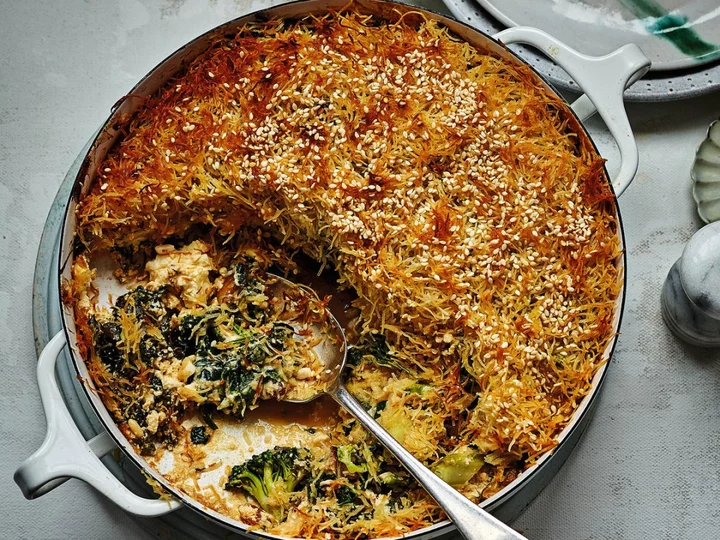
Kataifi: A comforting Greek pie full of veggie goodness
This pie is based on that comforting Greek favourite – spanakopita – although it is far more forgiving to make,” says Ravinder Bhogal. “There is no buttering and layering of delicate filo pastry: instead, the iron-rich mixture of greens and cheese is blanketed under a nest of buttered kataifi pastry, a shredded filo dough that crisps up beautifully when baked or fried. “You’ll find kataifi pastry in the fridge or freezer section of Middle Eastern grocers.” Broccoli, kale and spinach kataifi pie Ingredients: 2 tbsp olive oil 1 onion, thinly sliced 3 garlic cloves, very finely crushed 200g kale, tough ribs removed and leaves roughly chopped 200g spinach 250g broccoli, boiled till tender and roughly chopped 4 eggs 60g pine nuts 60g currants, golden raisins or barberries 250g feta cheese 250g ricotta Zest of 2 lemons and juice of 1 Handful of dill, roughly chopped Handful of flat-leaf parsley, roughly chopped A good grating of nutmeg 150g sour cream 250g kataifi pastry 60g butter, melted White sesame seeds, for sprinkling Sea salt and black pepper Method: 1. Preheat the oven to 180C/fan 160C/gas mark 4. 2. Heat the olive oil in a large pan over low-medium heat, add the onion and sauté for 10 minutes till sweet and caramelised. Add the garlic and fry again till fragrant, then add the kale and soften before adding the spinach. Once the greens are wilted, take off the heat and cool. 3. Transfer to a large bowl along with the broccoli and add the eggs, pine nuts, currants, feta, ricotta, lemon zest and juice, herbs, nutmeg and sour cream, and season with salt and pepper. Mix thoroughly. 4. Pull apart the strands of kataifi pastry to loosen and fluff them up. Stir the butter through the kataifi, coating it well. 5. Pour the spinach and ricotta filling into a deep pie dish – I use a 34cm baking dish. Gently pile the kataifi over the pie filling, sprinkle over the sesame seeds and bake for 35-40 minutes, or until the filling is hot and set and the kataifi pastry is golden brown. Serve with a light salad. Recipe from ‘Comfort & Joy: Irresistible Pleasures From A Vegetarian Kitchen’ by Ravinder Bhogal (Bloomsbury, £26). Read More Showstopping BBQ main dishes for a hot grill summer 7 TikTok food hacks that actually work Saltie Girl in Mayfair will make you happy as a clam – as long as you can afford it Chef Ravinder Bhogal: Vegetables are the secret to saving money How to make tomato confit with whipped feta These recipes will keep you hydrated on hot days
2023-06-08 19:28
